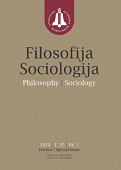A Theory of Justice and Social Mechanics
A Theory of Justice and Social Mechanics
Author(s): Laurynas DidžiulisSubject(s): Ethics / Practical Philosophy, Sociology, Philosophy of Science, Philosophy of Law, Philosophy of Law
Published by: Lietuvos mokslų akademijos leidykla
Keywords: theory of justice; social mechanics; social order; law; personal freedom; political will;
Summary/Abstract: In this article, I argue that Aristotle, a universal philosopher who analysed both natural and social worlds, suggested a groundwork for a theory of justice, which is a fertile soil for a broader social perspective. Such categories as the social order, free will, law, policy choices, and the state are naturally flowing from his brief passage on justice in his Nichomachean Ethics. I assert that all of them are phenomena of turbulent social mechanics. Therefore, in this paper I introduce Aristotle’s contribution to the mainstream theory of justice and then, loosely relying on the works of Aristotle and Newton, I develop a theory of justice in the context of social mechanics. I conclude that the concept of justice is essentially the same as Newton’s third law of mechanics. For this purpose, I employ interdisciplinary and functional approaches, textual and conceptual analysis, and the method of deduction.
Journal: Filosofija. Sociologija
- Issue Year: 35/2024
- Issue No: 2 -Special
- Page Range: 64-72
- Page Count: 9
- Language: English

